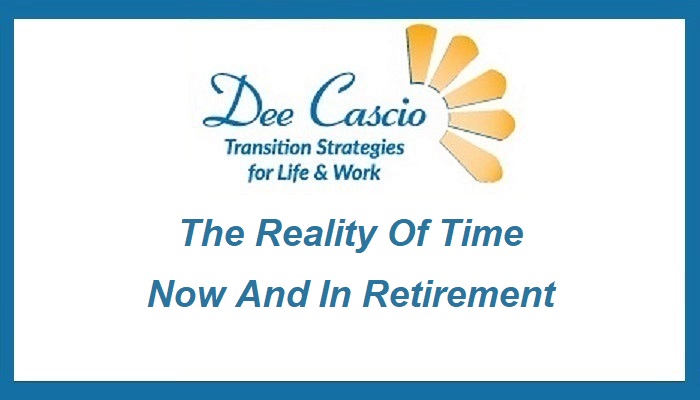If you are like most people, the reality of time is that you have too many things to do and not enough time to do them. As they say, “join the club.”
Years ago, I committed to looking more carefully at how I spend my time. As a result, I read Julie Morgenstern’s book Time Management from the Inside Out. This book was suggested by a client and then by others who acknowledged that they had read the book and had implemented some of her useful ideas.
When we are working, this elusive commodity of time challenges us to squeeze as much as we can into every minute of the day. The illusion is that once we are retired, we have all the time in the world to do the things we’ve always wanted to do. Unfortunately for many of us, retirement will not fix the “not enough time dilemma.” If we don’t plan well, we can end up taking time for granted and not accomplishing half of what we had intended to do.
The true reality of time is we all have 24 hours a day. It’s important to sleep at least seven to eight hours at night. That leaves us 16 to 17 hours to spend on a litany of obligations, requirements, and activities. We have six important life arenas that we live in daily. If you look at the six life arenas of career/work, family, health, self-care, leisure, and personal development, you can easily see how those 16-17 hours are absorbed throughout the day.
You may find yourself challenged by retirement because you have not learned how to manage your time and schedule without the discipline and structure imposed by work. As you reflect on your life after retirement, you might realize that time management is a missing essential skill. If you have not yet retired, you may be worried about what you will do with all of the time that you will have and whether you will feel fulfilled by the activities that you chose to replace work.
Some people have so many things they want to do that they get overwhelmed and don’t accomplish half of what they expected to. Sometimes outside forces affect our ability to get things that we had planned to do done. There may be a lot of needs from family members you may have to accommodate. If you are in transition between jobs or beginning or ending a relationship, these distractions could easily create confusion about how you want to use your time.
We can stand in our own way with emotional issues like anxiety or depression as it relates to this life stage. You might feel conflicted about wanting to be in a traditional retirement mode (and do nothing) as opposed to defining the activities that you would like to make a part of your retirement plan. Being vague about your goals and priorities can put you at the mercy of others who will define your time by putting demands on you. While you can stay busy meeting the needs of others, will these activities provide purpose and meaning in your life? Finally, are you worried about failing if you try something new—like starting a new business, going into a totally different career, pursuing a lifelong dream, or working on a relationship that needs attention?
No matter which category you fall in, the questions remain the same. What will you do about the reality of time? How will you create your own schedule and direct your own life while managing this precious commodity we call time? Will your calendar control your life? Will you have sticky notes and to-do lists in a variety of different places? Have you organized a working space for yourself but are not sure what you want to work on?
I am here to help you create a successful retirement lifestyle on your terms. It’s time to pursue your passion and dreams. At the very least, discover what your time is worth now and in retirement.
Face life and work transitions with confidence! Let life and work transitions author, speaker, and coach Dee Cascio show you how.
